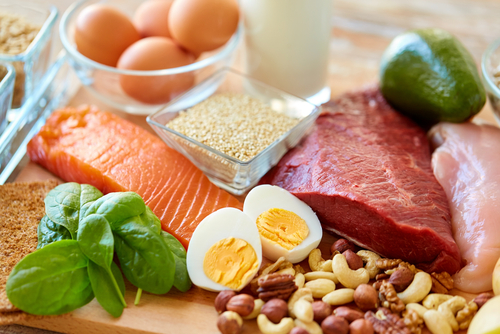Advertisement
The Benefits of Protein For Well Rounded Health

Protein is one of the three macronutrients, along with carbohydrates and fat, that is essential for the human body. It is important for building and repairing tissues, producing enzymes and hormones, and maintaining healthy bones, muscles, and skin. In this blog, we will explore why a high protein diet is important for the human body and the numerous benefits it provides.
What is Protein?
Protein is a macronutrient that is made up of amino acids. There are 20 different amino acids that can combine in different ways to form a variety of proteins. Proteins are found in a variety of foods, including meat, fish, eggs, dairy products, legumes, nuts, and seeds.
Why is Protein Important for the Human Body?
- Building and Repairing Tissues
Protein is essential for building and repairing tissues in the body. When you eat protein, it is broken down into amino acids, which are used to build and repair muscle tissue, bone tissue, skin, hair, and other tissues in the body. This is important for maintaining healthy body function and preventing illness and disease.
- Producing Enzymes and Hormones
Protein is also important for producing enzymes and hormones in the body. Enzymes are proteins that catalyze chemical reactions in the body, while hormones are proteins that regulate various bodily functions, such as growth and metabolism. Without adequate protein intake, the body may not be able to produce enough of these important molecules.
- Maintaining Healthy Bones, Muscles, and Skin
Protein is important for maintaining healthy bones, muscles, and skin. Bones are made up of a protein called collagen, while muscles are made up of proteins called actin and myosin. Skin is also made up of various proteins, including collagen and elastin. Adequate protein intake is essential for maintaining healthy bones, muscles, and skin throughout life.
- Supporting Weight Loss
Protein is also important for supporting weight loss. A diet high in protein can increase feelings of fullness and reduce hunger, leading to a decrease in overall calorie intake. In addition, protein can help to increase metabolism and promote fat loss, leading to a reduction in body weight and body fat percentage.
- Lowering Blood Pressure
Protein may also help to lower blood pressure. A diet high in protein has been shown to improve blood pressure in people with high blood pressure, possibly due to the effect of protein on blood vessel function.
- Improving Heart Health
Protein may also improve heart health by reducing inflammation and improving cholesterol levels. Studies have shown that a diet high in protein can reduce levels of LDL (bad) cholesterol and increase levels of HDL (good) cholesterol, which can help to reduce the risk of heart disease.
- Supporting Muscle Mass and Strength
Protein is important for supporting muscle mass and strength. When you exercise, your muscles experience micro-tears, which need to be repaired through a process called muscle protein synthesis. Protein provides the amino acids needed for muscle protein synthesis, allowing your muscles to recover and grow stronger.
Types of Protein
There are many different types of protein available, each with its own unique benefits and drawbacks. The most common types of protein include:
- Animal Proteins
Animal proteins are found in meat, fish, eggs, and dairy products. Animal proteins are considered complete proteins, meaning that they contain all of the essential amino acids needed by the body.
- Plant Proteins
Plant proteins are found in legumes, nuts, seeds, and grains. Plant proteins are often incomplete, meaning that they do not contain all of the essential amino acids needed by the body. However, by combining different plant proteins, such as beans and rice, it is possible to obtain all of the essential amino acids needed by the body.
- Protein Supplements
Protein supplements, such as protein powder, bars, and shakes, are also available. Protein supplements can be a convenient and easy way to increase protein intake, particularly for athletes and bodybuilders who require a high protein intake.
How Much Protein Do You Need?
The amount of protein you need depends on a variety of factors, including age, sex, weight, and activity level. The recommended daily intake of protein varies between 0.8 and 1.2 grams per kilogram of body weight per day. However, athletes and bodybuilders may require a higher protein intake to support muscle growth and recovery.
Protein is an essential nutrient that is important for building and repairing tissues, producing enzymes and hormones, and maintaining healthy bones, muscles, and skin. A high protein diet can provide numerous benefits, including supporting weight loss, lowering blood pressure, improving heart health, and supporting muscle mass and strength. There are many different types of protein available, including animal proteins, plant proteins, and protein supplements. By consuming adequate amounts of protein as part of a balanced diet, you can support overall health and well-being.















